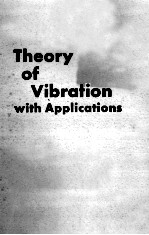

THEORY OF VIBRATION WITH APPLICATIONSPDF电子书下载
- 电子书积分:15 积分如何计算积分?
- 作 者:
- 出 版 社:INC.
- 出版年份:1972
- ISBN:
- 页数:467 页
1 OSCILLATORY MOTION 1
1.1 Introduction 1
1.2 Harmonic Motion 2
1.3 Harmonic Analysis 5
1.4 Transient Time Function 7
1.5 Random Time Function 8
1.6 Properties of Oscillatory Motion 9
2 FREE VIBRATION 14
2.1 Force Summation Method 14
2.2 The Energy Method 17
2.3 Effective Mass 19
2.4 Damped Free Vibration 21
2.5 Logarithmic Decrement 27
2.6 Coulomb Damping 31
2.7 Stiffness and Flexibility 32
3 HARMONICALLY EXCITED MOTION 45
3.1 Introduction 45
3.2 Forced Harmonic Vibration 45
3.3 Rotating Unbalance 49
3.4 Whirling of Rotating Shafts 54
3.5 Support Motion 56
3.6 Vibration Measuring Instruments 58
3.7 Vibration Isolation 62
3.8 Damping 65
3.9 Equivalent Viscous Damping 69
3.10 Structural Damping 71
3.11 Sharpness of Resonance 72
4 TRANSIENT VIBRATION 79
4.1 Introduction 79
4.2 Impulse Excitation 79
4.3 Arbitrary Excitation 81
4.4 The Laplace Transform Formulation 88
4.5 Response Spectrum 93
4.6 The Analog Computer 98
4.7 Finite Difference Digital Computation 108
4.8 The Runge-Kutta Computation 117
5 TWO DEGREES OF FREEDOM SYSTEMS 127
5.1 Introduction 127
5.2 Normal Mode Vibration 128
5.3 Coordinate Coupling 134
5.4 Forced Harmonic Vibration 138
5.5 Vibration Absorber 141
5.6 The Centrifugal Pendulum Absorber 142
5.7 The Vibration Damper 144
5.8 Gyroscopic Effect on Rotating Shafts 149
5.9 Digital Computation 151
6 MULTIDEGREE OF FREEDOM SYSTEM 166
6.1 Introduction 166
6.2 The Flexibility and Stiffness Matrix 167
6.3 Reciprocity Theorem 170
6.4 Eigenvalues and Eigenvectors 170
6.5 Orthogonal Properties of the Eigenvectors 174
6.6 Repeated Roots 175
6.7 The Modal Matrix P 178
6.8 Forced Vibration and Coordinate Decoupling 180
6.9 Forced Normal Modes of Damped Systems 181
6.10 State Space Method 186
7 LUMPED PARAMETER SYSTEMS 196
7.1 Introduction 196
7.2 Characteristic Equation 197
7.3 Method of Influence Coeffcients 197
7.4 Rayleigh Principle 200
7.5 Dunkerley’s Formula 209
7.6 Method of Matrix Iteration 213
7.7 Calculation of Higher Modes 215
7.8 Transfer Matrices (Holzer-Type Problems) 219
7.9 Torsional System 221
7.10 Geared System 231
7.11 Branched Systems 232
7.12 Beams 234
7.13 Repeated Structures and Transfer Matrix 242
7.14 Difference Equation 245
8 CONTINUOUS SYSTEMS 261
8.1 Introduction 261
8.2 The Vibrating String 262
8.3 Longitudinal Vibration of Rods 265
8.4 Torsional Vibration of Rods 267
8.5 The Euler Equation for the Beam 271
8.6 Effect of Rotary Inertia and Shear Deformation 275
8.7 Vibration of Membranes 276
8.8 Digital Computation 278
8.9 Transient Solution by Laplace Transforms 286
9 LAGRANGE’S EQUATION 295
9.1 Introduction 295
9.2 Generalized Coordinates 295
9.3 Principle of Virtual Work 296
9.4 Development of Lagrange’s Equation 300
9.5 Generalized Stiffness and Mass 303
9.6 Mode Summation Method 305
9.7 Beam Orthogonality,Including Rotary Inertia and Shear Deformation 311
9.8 Normal Modes of Constrained Structures 313
9.9 Mode-Acceleration Method 318
9.10 Component Mode Synthesis 320
10 RANDOM VIBRATION 332
10.1 Introduction 332
10.2 The Frequency Response Function 334
10.3 Spectral Density 336
10.4 Probability Distribution 343
10.5 Correlation 352
10.6 Fourier Transform 355
10.7 Response of Continuous Structures to Random Excitation 361
11 NONLINEAR VIBRATIONS 370
11.1 Introduction 370
11.2 The Phase Plane 371
11.3 Conservative Systems 373
11.4 Stability of Equilibrium 375
11.5 Method of Isoclines 378
11.6 The Delta Method 380
11.7 Lienard’s Method 383
11.8 Slopeline Numerical Integration 385
11.9 The Perturbation Method 389
11.10 Method of Iteration 392
11.11 Self-Excited Oscillations 397
11.12 Analog Computer Circuits for Nonlinear Systems 399
11.13 The Runge-Kutta Method 401
APPENDICES 412
ANSWERS TO SELECTED PROBLEMS 448
INDEX 461
